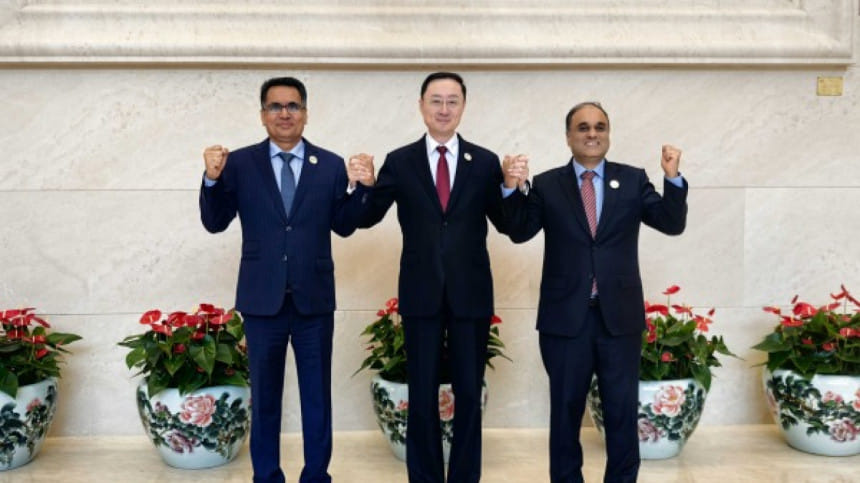Trilateral talks and geopolitical questions

The recent meeting aimed at boosting trilateral cooperation among China, Pakistan, and Bangladesh might have deeper geopolitical implications, foreign policy experts have said, urging Dhaka to move cautiously considering the regional and global geopolitical dynamics.
They also questioned the rationale for the trilateral meeting given that Bangladesh is under an interim administration and already maintains bilateral relations with China and Pakistan.
The meeting was held on the sidelines of the 9th China-South Asia Exposition and the 6th China-South Asia Cooperation meeting in Kunming, Yunnan province of China, on June 19.
Bangladesh's acting foreign secretary Ruhul Alam Siddique, Chinese Vice Foreign Minister Sun Weidong, and Pakistani Additional Secretary (Asia Pacific) Imran Ahmed Siddiqui attended the meeting in person.
Pakistan Foreign Secretary Amna Baloch joined via video link.
Following the trilateral meeting, each of the three nations issued separate statements.
While Bangladesh called it an "informal meeting", Pakistan termed it as "the inaugural meeting of the trilateral mechanism".
In their statements, China and Pakistan said the three sides agreed to explore and implement cooperation projects in such areas as trade, maritime affairs, climate change, agriculture, human resources, education, and culture.
Three countries agreed to establish a joint working group to implement the understandings reached during the meeting, their statements added.
Bangladesh, statement, however, did not mention any such agreement.
All three countries, however, agreed to forge cooperation on the principles of openness, inclusivity, good neighbourliness, equality, mutual trust and common development.
"It was an informal meeting. Nothing substantial was decided," a foreign ministry official, wishing to remain anonymous, told this newspaper.
Bangladesh's inclusion in the "trilateral cooperation mechanism" drew questions from foreign policy analysts and an economist.
Selim Raihan, professor of economics at Dhaka University, said this trilateral initiative has significant geopolitical implications and raises an important question: "Does the current interim government have the mandate to commit the country to any strategic alignments?"
He stated that the interim government is primarily tasked with overseeing important reforms and preparing for the national election; its authority to enter into long-term international agreements would be highly questionable.
Obaidul Haque, associate professor of international relations at Dhaka University, thinks China has taken the initiative considering the short tenure of the interim government in Bangladesh.
He said the trilateral initiative could be intended to recalibrate power dynamics in the South Asian region and expressed his doubts about its effectiveness in the long run.
He said it is important for Bangladesh to keep in mind the geopolitical reality. "We cannot ignore India. So, we have to be aware of our national interest."
The relations between Bangladesh and India have remained strained since the ouster of Sheikh Hasina, who is sheltered in New Delhi.
On the other hand, Bangladesh's relations with Pakistan have improved somewhat following the political changeover.
China has good relations with both Bangladesh and Pakistan -- both members of China's Belt and Road Initiative, a geopolitical project of China opposed by India and the US and its allies.
Obaidul said, "Bangladesh and China already enjoy solid trade ties. As for Bangladesh-Pakistan relations, there's been some improvement lately -- but it's unlikely to go much further since there's not a whole lot of economic incentive. Plus, there's still some historical baggage between them that hasn't really been dealt with."
Former ambassador M Humayun Kabir said the interim government already has a lot of work to do before the elections, and why it needed to be involved in such an initiative is not clear.
"It should have consulted the relevant stakeholders before such a trilateral meeting when we already have good bilateral relations with these countries.
"Whatever we do, we must think of the past, present and future. Prudence is better than repentance."

 For all latest news, follow The Daily Star's Google News channel.
For all latest news, follow The Daily Star's Google News channel. 



Comments